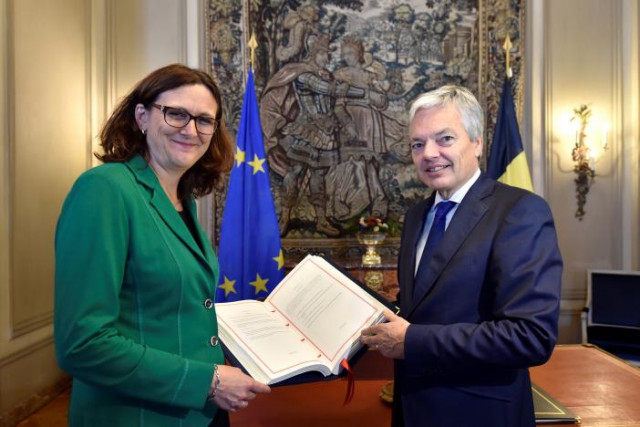EU, Canada to sign free trade deal after weeks of uncertainty
The Canadian agreement is seen as a springboard to a larger EU deal with the United States viz. TTIP

Belgium's Foreign Minister Didier Reynders (R) and EU trade commissioner Cecilia Malmstrom pose with the annexes of the Comprehensive Economic and Trade Agreement (CETA), a planned EU-Canada free trade agreement, at the Lambermont Residence in Brussels, Belgium, October 29, 2016. PHOTO: REUTERS
TTIP: EU, US trade deal not dead yet
Canadian Prime Minister Justin Trudeau is expected in Brussels for a signing ceremony with leaders of the EU institutions billed as an EU-Canada summit, all eager to ink a deal before any further hiccup.
The French speakers of southern Belgium, a minority within their own small country and accounting for less than 1 percent of the 508 million EU consumers likely to be affected by the deal, had held it up until a breakthrough on Thursday, confirmed by regional parliamentary votes on Friday.
The Canadian agreement is seen as a springboard to a larger EU deal with the United States, known as the Transatlantic Trade and Investment Treaty (TTIP), which has been much criticized by civil society groups and some politicians.
While that deal was planned to be completed before the end of U.S. President Barack Obama's term in January, both sides now acknowledge this is no longer feasible.
Stalled: Canada says EU’s ‘job’ to save trade pact
On Saturday, EU Trade Commissioner Cecilia Malmstrom said TTIP was not dead and talks with the United States would continue with the next U.S. administration.
Supporters say the Comprehensive Economic and Trade Agreement (CETA) with Canada will increase trade between the partners by 20 percent and boost the EU economy by 12 billion euros ($13 billion) a year and Canada's by C$12 billion ($9 billion).
This would come at a time of low growth with monetary policy at its limits and fiscal policy constrained.
For Canada the deal is important to reduce its reliance on the neighboring United States as an export market.
For the EU, it is a first trade pact with a G7 country and a success plucked from the jaws of defeat at a time when the bloc's credibility has taken a beating from Britain's vote in June to leave after 43 years of membership.
"I think we are signing the best commercial treaty the European Union has ever signed with a particularly close partner which shares our values," Belgian Foreign Minister Didier Reynders said on Saturday.
France to call for halt to talks on EU-US trade deal: minister
However, Sunday's signing is not the last act.
Assuming the European Parliament gives its assent, CETA could come into force partially early next year, allowing import tariffs to be removed. However, full implementation to include a contentious investment protection system will only follow after clearance by some 40 national and regional parliaments.
The Belgian experience shows this is not a given.
On Thursday, Belgium’s regions and the federal government agreed on a text addressing fears about the investment protection regime, saying it would not come into force during an initial period. It also has a safeguard clause to protect Belgian farmers in the event of a "market imbalance".
The investment protection system has been the focus of most protests against CETA and TTIP. Critics says the system, with arbitrage panels to rule on disputes between states and foreign investors, could be abused by multinational companies to dictate public policy, such as on environmental standards.
The EU and Canada say their investment protection system guarantees the right of governments to regulate and would use independent judges and be more transparent.
The deal will eliminate tariffs on almost 99 percent of goods. The beneficiaries would include, for example, carmakers or the EU textile sector, for which Canadian duties of up to 18 percent can be imposed.
Service companies could also benefit and EU companies would be able to tender for public contracts at Canadian provincial and municipal level, the first time Canada has offered this.
Canada can send larger quotas of pork, beef and wheat to the EU market. EU dairy producers will be able to export more than double the amount of "high quality" cheeses to Canada.



















COMMENTS
Comments are moderated and generally will be posted if they are on-topic and not abusive.
For more information, please see our Comments FAQ